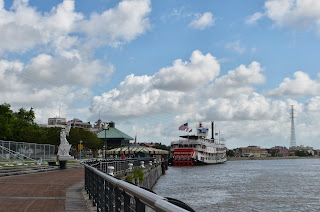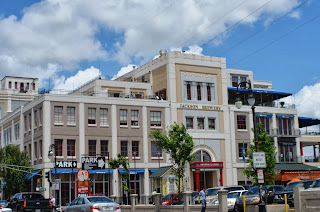Immediately, we saw the influence of Jazz in this town.
 |
| home of famous Jazz musician Daniel Barker his wife, Louise Dupont Barker (Blue Lu Barker) wroteand sang the jazz song 'Don't You Feel my Leg" |

 |
| a band playing in the street |
We rode the Algiers Ferry over to Canal Street in the French Quarter.

 |
| our traveling buddies Pete and Jean |
 |
| docking |
There are many streetcars around town
there are lots of festive /Mardi Gras type decorations about town.
The Riverwalk was beautiful
We chose the walking tour but there are also boat tours of the city.
Our group in our walking tour
The roof and terrace gardeens were beautiful to see
The residential area of the French Quarter was Townhouse style. The residence on top and business on the street level. The balconies were absolutely beautiful.
Because there is not a front or backyard, if you were fortunate to have access from the street, a courtyard could be designed.
There were actually trains that ran through the French Quarter.
There were artists of all kind selling their wares.
The Louis Cathedral and the Cabildo are famous historical landmarks.
 |
| At the back of the cathedral |
The Cabildo is to the left of the cathedral. It served as a city hall, a courthouse, a prison and since 1911, the flagship home of the Louisiana Purchase ( the transfer agreement was signed here).
street scenes in the French Quarter:
 |
| note the horse drawn cart. this was another means of touring the French Quarter |
Architectural items
New Orleans is famous for its coffee and doughnuts, however this is more accurate to say "cafe au lait and beignets. The 'original''coffee shop is in the French Quarter, the Cafe du Monde. It was established in the French Market in 1862 and still operates today...24 hours/day...7 days/week. the traditional coffee is a dark roasted coffee with chicory (Cafe au lait) and served with an equal part of hot milk. in the early history of Louisiana, chicory was added to coffee to stretch dwindling supplies.
The only menu items at the Cafe du Monde are coffee and beignets.
 |
| Looooong lines,too!!! |
 |
| a picture of their beignets and Cafe au Lait |
The word beignet (pronounced bey-YAY) comes from the early Celtic word bigne meaning "to raise" It is also French for 'fritter" Beignets, a New Orleans specialty, are fried raised pieces of yeast dough, usually about 2 inches in diameter or 2 inches square. After being fried, they are sprinkled with sugar or coated with various icings. There is no factual confirmation of the origin of this simple pastry. One speculation is that it originated with the Ursuline Nuns of France, who came to Lousiana in 1727.
 |
| the convent for the Ursuline Nuns |
 |
Beignets are like a sweet doughnut, but square shaped and without a hole. They are considered the forerunners of the raised doughnut. When you hear people in New Orleans say "Going for coffee and doughnuts, they mean coffee and beignets.
Due to the long lines at the Cafe du Monde, we chose to have ours at the coffee shop beside the Jackson Brewery. Since it was so hot, Bruce chose for us an iced vanilla latte. Such a wonderful treat!!!
We had a tasty meal at the Jackson Brewery Bistro Bar. I had talapia and shrimp over rice with grilled asparagus and Bruce had jambalaya.
What a wonderful day!! Very tiring five miles of walking in the Louisiana heat.











































